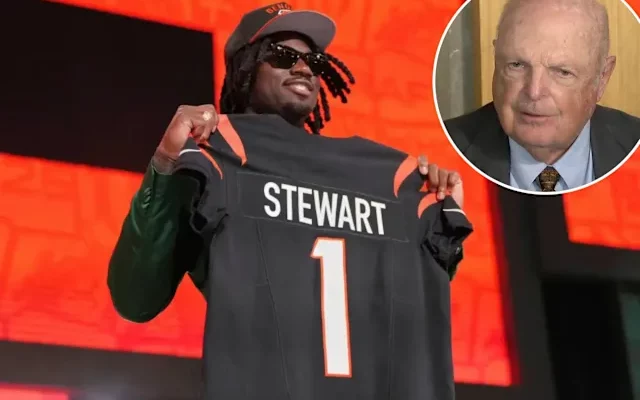Cincinnati Bengals owner Mike Brown has never been one to shy away from speaking his mind, and once again, his candor has brought an inside look into a negotiation standoff that has gripped the franchise’s offseason. Rookie Shemar Stewart, the Bengals’ highly touted first-round pick, remains absent from training camp, and according to Brown, the core of the issue isn’t money in the traditional sense—it’s about contract guarantees tied to “detrimental conduct.” This revelation has added an intriguing layer to an already tense situation, pulling back the curtain on one of the more nuanced battles between player and team in recent NFL memory. Brown, speaking to reporters in his usual straightforward tone, explained that while both sides have been in communication, the disagreement revolves around clauses in Stewart’s rookie deal that the Bengals insist on, but Stewart’s representatives have pushed back against. Specifically, it’s about how much of the guaranteed money in his contract could be voided if the team deems that Stewart engaged in conduct detrimental to the club. This is not an entirely new sticking point for the Bengals organization, as the team has historically taken a firm stance in contract negotiations, often avoiding guarantees beyond injury protection. But for fans hoping to see Stewart in stripes this preseason, it’s a frustrating reminder that the business side of the sport can sometimes overshadow the excitement of a new star arriving in town.
Stewart, a dominant defensive prospect coming out of college, was expected to make an immediate impact for Cincinnati’s defensive front. His combination of size, athleticism, and disruptive play had fans buzzing, especially after his standout performance during pre-draft workouts. The Bengals invested heavily in scouting him, confident he could become a cornerstone of their defense for years to come. However, the excitement has been put on hold as Stewart’s camp insists that the language in the deal be adjusted to protect the player’s financial security against what they view as overly broad and potentially subjective interpretations of “detrimental conduct.” In practical terms, such clauses can cover a wide range of actions—anything from off-field legal trouble to perceived breaches of team policy. While teams argue that these protections are necessary to maintain discipline and uphold organizational standards, players and their agents worry about the power imbalance it creates, especially when millions of guaranteed dollars are at stake.
From Brown’s perspective, the issue is not about mistrusting Stewart personally but about maintaining consistency in how the Bengals handle contracts. The Bengals have long been one of the more traditionally run franchises in the league, often sticking to principles they’ve held for decades, even when other teams have adapted to more player-friendly approaches. Brown emphasized that the team’s stance is rooted in protecting the organization from potential future issues, citing past situations—both in Cincinnati and around the NFL—where players’ actions forced teams into difficult positions. For Stewart’s representatives, though, this is about the message the clause sends and the financial implications if it’s enforced. The NFL is a league where careers can be short and contracts, despite headline numbers, can be far less secure than in other major sports. Protecting guaranteed money has become a central priority for top draft picks, and Stewart’s camp appears determined to hold their ground until they feel his deal reflects that.
The holdout comes at a crucial time for the Bengals, who are looking to bounce back after a season that fell short of expectations. With star quarterback Joe Burrow healthy again and the offense poised to contend, the defense remains an area of focus, and Stewart’s absence leaves a noticeable gap in training camp. Coaches had planned to integrate him early into the defensive rotation, giving him reps alongside veterans to accelerate his transition to the NFL. Now, those plans are in limbo. Teammates have voiced their support for Stewart publicly, with some acknowledging that the business side of football can be brutal for rookies, especially those entering an era where player empowerment is more pronounced than ever. Others have expressed hope that the sides can come to an agreement soon, understanding that every day missed is another step back in Stewart’s readiness to contribute in Week 1.
For fans, this situation is a mix of disappointment and understanding. Stewart is seen not just as a talented rookie but as a potential game-changer, and watching him sit out instead of developing chemistry with the defense is frustrating. At the same time, the awareness of how NFL contracts work—and how much is at stake for players financially—has grown significantly in recent years. Many supporters recognize that Stewart’s stance isn’t about greed but about ensuring long-term security in a league where injury risk and career volatility are constant factors. The debate over detrimental conduct clauses also sparks a broader conversation about fairness and trust between teams and players. The term “detrimental conduct” can be interpreted widely, and while teams argue it’s a necessary safeguard, players worry that it can be applied arbitrarily. Even minor disputes, disagreements with coaches, or actions outside the building that don’t lead to legal trouble could, in theory, be used as grounds to recoup guaranteed money.
Around the league, this standoff is being watched closely. Other rookies and their agents will be paying attention to whether Stewart is able to negotiate more favorable language, as it could set a precedent for future contracts. Similarly, other front offices will take note if the Bengals stick to their principles and ultimately get Stewart to agree on their terms. In an era where rookie holdouts have become less common due to the structured rookie wage scale, disputes like this are rarer but can still become flashpoints when they center on contractual protections. Historically, the Bengals have shown a willingness to let players sit if they feel it’s necessary to maintain their approach to contracts. Brown has long been known as a traditionalist who values consistency and resists changing course unless absolutely necessary. That stance has earned the organization both praise for its discipline and criticism for being inflexible in a league that constantly evolves.
For Stewart, the decision to hold out is not without risk. Missing camp means missing valuable learning time, and while he can study the playbook away from the facility, there’s no substitute for live reps. The Bengals coaching staff will have to adjust their plans, possibly giving more preseason snaps to other defensive linemen competing for roster spots. The longer Stewart is absent, the more difficult it will be for him to catch up and make the impact the team envisioned in his rookie year. Yet from his perspective, securing favorable contract terms now is worth the short-term setback. Rookie deals are often the foundation for a player’s career earnings, and ensuring that his guaranteed money is as protected as possible could have long-term benefits, especially if he faces injury or unforeseen disputes.
The coming days will likely be critical. Both sides have reasons to reach an agreement sooner rather than later. The Bengals want their top pick on the field, and Stewart wants to begin his professional career without lingering tension over his contract. While neither Brown nor Stewart’s representatives have indicated that negotiations have broken down entirely, the gap on this issue remains significant. It’s possible that a compromise could be found in the form of narrower definitions of “detrimental conduct” or partial protections that satisfy both parties. Until then, fans, teammates, and league observers will continue to watch as the drama unfolds, knowing that the outcome could influence not just the Bengals’ season, but also how similar disputes are handled across the NFL in the years ahead.
If the standoff ends soon, this could become just a minor footnote in what might be a stellar career for Shemar Stewart. But if it drags on, it risks becoming a defining moment before he even steps on the field. In a league where perception and precedent matter, both Stewart and the Bengals are playing a high-stakes game—one where the prize is more than just a signed contract, but the power to shape how business gets done in the future. The hope in Cincinnati is that football, not fine print, will soon take center stage again.



